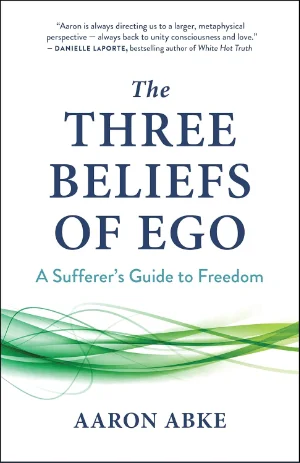Have you ever noticed how sadness, anger, or fear just keep circling back in your life—no matter how much you pray, meditate, or try to will them away?
For a long time, I thought that meant something was wrong with me. Maybe I wasn’t spiritual enough, faithful enough, or disciplined enough. But when I came across Aaron Abke’s book The Three Beliefs of Ego, it shifted how I saw those emotions and the stories underneath them.
Why This Book Spoke to Me
I first found Aaron’s content while I was questioning a lot about faith and spirituality. I wasn’t walking away from Yeshua, but I was letting go of some of the boxes religion had put him in. Much of what Aaron shared via his YouTube channel resonated with where I was heading, so when his book released, I knew I had to read it.
What struck me about the book wasn’t just that he talked about suffering, but how he framed it. He boiled all human suffering down to three emotions: sadness, anger, and fear.
And behind each of those emotions are three core beliefs of the ego: lack, attachment, and control.
When I looked at my life, I could see them everywhere:
- Lack — the nagging feeling of “I’ll never be enough” or “I don’t have what it takes.”
- Attachment — clinging to outcomes, tying my worth to results, obsessing over success or failure.
- Control — carrying the illusion that everything depends on me and that if I don’t hold it together, it will all fall apart.
It hit me that these weren’t just my struggles—this is the human condition.
Core Ideas from the Book

The Ego’s Lies
The ego’s entire game is convincing us that we’re separate from God. It whispers: you don’t have enough, you’re not enough, you’d better stay in control.
Aaron even suggests that the “original sin” in the Garden wasn’t eating the fruit—it was believing in separation. Eve forgot she was already like God, already connected. And don’t we do the same?
I see it in my own life. Every time I hustle to prove myself, chase affirmation, or spiral in anxiety, what’s really underneath is the belief: God’s not here. I’m on my own.
But if separation is the illusion, then unity is the truth. I was never actually cut off—I just believed I was.
Emotions as Guidance
One of the most powerful ideas for me was that our emotions are not the enemy.
I grew up hearing “don’t trust your feelings,” but Aaron flips that. He says emotions are like an internal GPS. They’re not wrong—they’re signals.
- Peace, joy, love → alignment with Source.
- Sadness, anger, fear → signs that we’ve believed a lie.
That means emotions aren’t obstacles to conquer, but invitations back into alignment with truth.
The Way Through
So how do we actually deal with the ego?
Aaron’s antidote is love, stillness, and surrender. He describes a practice called requalification:
- Accept the feeling.
- Trace it back to which belief (lack, attachment, control) is driving it.
- Reframe it with truth until you feel relief.
For me, this looked like catching myself in the thought: “I’m not enough. I’ll never get this right.” That’s lack. The requalification is: “There is no lack in me, because there is no lack in God.”
This isn’t about pretending everything’s fine. It’s about remembering what’s true.
And when I think about it, this is exactly what Yeshua modeled in the wilderness. Every temptation was tied to ego:
- Stones into bread → lack.
- Bowing for power → attachment.
- Throwing himself off the temple → control.
And each time, his answer was trust and surrender: God is enough. Don’t use power for ego-driven motives. Rest in the Divine.
Why It Matters
This book reminded me that my emotions don’t mean I’m broken. They mean I’ve believed a lie. Sadness, anger, and fear aren’t proof that God is far away—they’re proof that I’ve forgotten I’m already one with Him.
And the path back isn’t striving or fixing myself. It’s choosing love, forgiveness, and surrender.
My Takeaways
Practicing Stillness
Stillness has always been tough for me. My mind doesn’t slow down easily. But this book reframed stillness as a doorway into reality.
Silence isn’t passive—it’s a way of taking power back from the ego. Every time I choose not to feed its noise, it loses energy.
I’ve started small: two minutes of silence here, a mindful breath session there. It’s not about perfection—it’s about creating space to notice and let the lies dissolve.
Choosing Forgiveness
Aaron writes, “We should aspire to forgive others with the same speed we desire forgiveness for ourselves.”
That line cut deep. Because I know how quick I am to want grace for myself, but how slow I can be to extend it.
Forgiveness isn’t about excusing people—it’s about staying free. Holding grudges feeds separation. Forgiving aligns me with love. And that’s exactly what Yeshua modeled: “Father, forgive them…”
Living as If There’s No Lack
This one is simple, but not easy: live as if lack doesn’t exist.
If God is love and God is in me, then lack can only exist if I withhold love—from myself, from others, from God.
So I’ve been practicing giving more freely—love, attention, kindness, even time. And sure enough, the more I give, the less I feel like I’m missing anything.
A Question for You
Which of these three beliefs—lack, attachment, or control—shows up most often in your life?
And what would it look like to live as if you were already one with God’s love?
I’d love to hear your reflections.

I love this summary. Thank you!
Thanks for taking the time to read it. I’m glad you found it helpful!